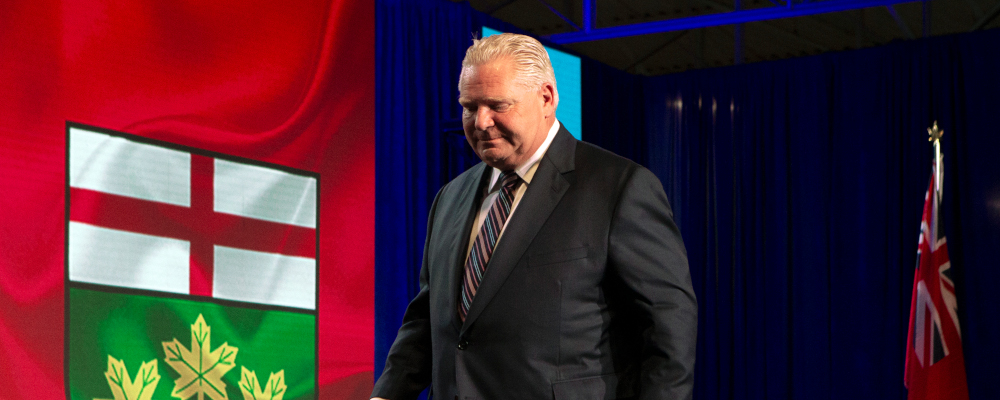Speculation is that Ontario Premier Doug Ford will soon appoint the members of his new cabinet. According to the old axiom “personnel is policy”, these decisions may be among the most important that the premier makes in his second term. They will invariably influence the ambition and orientation of the government’s policy agenda.
It’s widely held that a major part of the Ford government’s political success has been its efforts to orient its conservative ideas and impulses to the interests, concerns, and aspirations of working-class Ontarians. This unorthodox policy agenda has manifested itself in tax reductions for low-income Ontarians, a large, generous, and progressive child tax benefit, a new labour model for gig workers, apprenticeship reform, a ban on non-compete agreements, and the endorsement of a new portable benefit for workers without employer-provided benefits.
The political upshot of these policy-based appeals to working-class voters was the endorsements of more than a half dozen private sector trade unions in the recent election campaign and, ultimately, seat gains in working-class ridings like Thunder Bay, Timmins, and Windsor. These developments have rightly been interpreted as signs of a political realignment in the province.
Yet one can also overstate this sort of analysis at this stage. Although the government’s re-election should be viewed as a return on investment for its early efforts to reach working-class Ontarians, a full and durable realignment is incomplete. The goal of the second term should be to see it through. The forthcoming cabinet appointments are a key first step.
That’s because most progress to date has been concentrated in the policy innovation and stakeholder engagement of Labour Minister Monte McNaughton who not only understands the political fecundity of a new, more working-class conservatism (he recently said that “this is where leading conservative parties need to be”Ontario PCs’ pivot to blue-collar concerns helped it flip several ridings from the NDP https://www.theglobeandmail.com/canada/article-ontario-pcs-pivot-to-blue-collar-concerns-helped-it-flip-several/), but also seem to reflect it in his own tastes, preferences, and persona. He personifies the people and places that are key to building a durable, broad-based, and modern Conservative coalition in the province.
The challenge of course is that McNaughton cannot be cloned. The test for the government, therefore, is whether it can extend his reformist energy and insights across the various government ministries and different policy areas.
This will require that the premier appoint the right people in the right roles. But personnel may be a necessary yet insufficient determinant of the government’s ultimate policy and political progress. It will be even more important that Premier Ford conveys this working-class ethos—what I referred to in a recent Hub articleIf Doug Ford needs a governing agenda, improving Ontarians’ quality of life would be a good start https://thehub.ca/2022-06-07/if-doug-ford-needs-a-governing-agenda-improving-ontarians-quality-of-life-is-a-good-start/ as “quality-of-life conservatism”—to incoming ministers and their staff as well as the senior provincial bureaucracy.
It can neither be a mere slogan nor the sole purview of a single minister. It must come to represent a policymaking lens that’s broadly applied across the government. That’s ultimately how to ensure that the premier’s sincere yet oft-undefined working-class instincts are translated into a credible, consistent, and constructive policy agenda.
A recent memorandum to government officials and external partners from Ontario’s outgoing Advocate for Community Opportunities and Chair of the Premier’s Council on Equality of Opportunity identifies some short-term priorities along these lines, as well as possible obstacles to the development and implementation of a working-class agenda. (The Hub obtained a copy of the memo from one of its recipients and has since verified its authenticity.)
According to Jamil Jivani, who was appointed to the role of provincial advocate in December 2019 and stepped down earlier this month, the Ford government should prioritize education and mental health issues to account for the distributional consequences of pandemic lockdowns which, according to various studiesCOVID school closures most harm students from poorest neighborhoods https://news.yale.edu/2021/01/05/covid-school-closures-most-harm-students-poorest-neighborhoods and reports,Learning loss due to school closures during the COVID-19 pandemic https://www.pnas.org/doi/10.1073/pnas.2022376118 disproportionately harmed marginalized youth. As he outlines in the memo:
These particular recommendations [including cutting wait times for children to receive psychological services and more funding for community groups helping working-class youth overcome pandemic-induced learning loss] would address the greatest needs created by pandemic lockdowns and school closures, and therefore will provide the biggest bang for the buck when it comes to providing all Ontario youth with equality of opportunity.
The subtext of Jivani’s memo is that the government’s working-class ambitions won’t find full expression without addressing these secondary effects of the pandemic. One reads a sense of the duty of care in his outgoing advice. He believes that the government has a moral obligation to help those most affected by its own policy choices over the past two years.
More generally, Jivani warns that the premier and his cabinet will need to overcome what he describes as “bureaucratic paternalism” within the government itself if they’re to make greater progress on working-class priorities. His criticism here applies equally to the political and public service arms of the Ontario government.
The implication is that Queen’s Park has grown accustomed to dealing with sophisticated special interests that have their own lobbyists or industry groups and that this culture of clientelism (which has existed far longer than the current government) too often leaves ordinary people excluded or forgotten.
Accounting for this inherent asymmetry, therefore, requires a combination of leadership, sustained effort, and a genuine commitment to inclusion. It must ultimately be about pulling new and different voices into the policymaking process. As Jivani puts it: “the province would benefit from an approach that encourages substantive diversity and inclusion in the form of experiential, educational, religious, and geographic differences.”
If the Ford government is to be lauded for its first-term efforts to reach working-class Ontarians, the decision it makes in the coming days and weeks—including (but not limited to) the composition of its new cabinet—may well determine how much further progress is achieved in its second term. The prospect of completing a full political realignment in the Province of Ontario is within the government’s reach. But it will need to follow McNaughton’s lead and Jivani’s advice in order to get there.
Recommended for You

‘They’re voting with their eyeballs’: Sean Speer on the revealed preferences of Canadian news consumers

Kirk LaPointe: B.C.’s ferry fiasco is a perfectly Canadian controversy

‘I want to make Canada a freer country’: Conservative MP Andrew Lawton talks being a newbie in Parliament, patriotism, and Pierre Poilievre’s strategy

The state of Canada’s economy halfway through 2025




